web_european-court-of-auditors_transparencyinternational.jpg

The European Court of Auditors
Although the accounts were signed off as giving “a true and fair view” of the EU’s financial position, the watchdog gave an adverse opinion on expenditure, indicating widespread problems.
Auditors also stressed the need for robust and efficient management of the massive Covid-19 recovery package, which is set to double EU spending in the coming years.
High-risk expenditure in 2019 represented more than half (53%) of all audited spending, and because of the way the EU budget evolves, this has increased in recent years.
It mainly concerns reimbursement-based payments in areas such as rural development and cohesion (the aspect of EU spending aimed at supporting development in its poorest countries), where spending is managed by member states.
High-risk expenditure is subject to complex rules and eligibility criteria, and material error was present at an estimated rate of 4.9% (in 2018 it was 4.5%).
The auditors concluded that errors in spending were pervasive, and gave an adverse opinion on that aspect of the accounts.
“Our adverse opinion on EU spending for the year 2019 is a reminder that we need clear and simple rules for all EU finances, and we also need effective checks on how the money is spent and whether the intended results are achieved,” said ECA president Klaus-Heiner Lehne.
“This is particularly important in view of the planned recovery fund to combat the effects of the Covid-19 pandemic.”
Lehne said the European Commission and member states have “a tremendous responsibility” to manage the EU’s finances soundly and efficiently, especially in a time of crisis.













